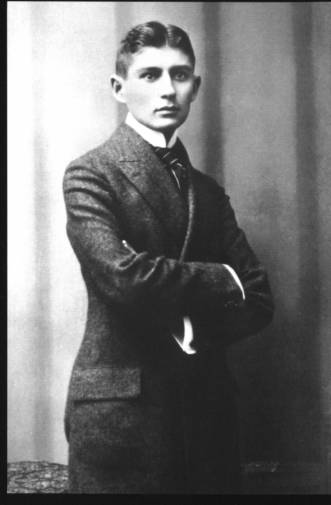 In ‘The Trial’, the last words uttered by Kafka’s protagonist K. as he is judicially murdered, a knife buried in his heart by two men in frock-coats and top-hats for reasons neither he nor the reader understand, are “Like a dog”.
In ‘The Trial’, the last words uttered by Kafka’s protagonist K. as he is judicially murdered, a knife buried in his heart by two men in frock-coats and top-hats for reasons neither he nor the reader understand, are “Like a dog”.Of course, it’s been pointed out so often that it’s gone way beyond a cliché that Kafka anticipated the totalitarianism that descended on so many European countries during the twentieth century, but it’s worth remembering that what he was chiefly exploring in his novels was the gulf between the ordinary person and the authorities in his own country in his own time, in other words, the Habsburg Empire.
I wonder what his reaction would be were he to come back to his native
I grew up in Britain, a country where information is quite freely available and most things are allowed unless they’re expressly forbidden, and so for me living to a country where the opposite sometimes seems to be true, and it all happens in a language I still don’t feel exactly the master of, is, to put it mildly, a bit tricky at times.
Although proposals to introduce identity cards in the
But I do find it curious that every citizen has to have a special number, a ‘birth number’, in addition to their ID card number, passport number, driving license number and all the other numbers they have. Or that it is a legal obligation to have a permanent address registered with the authorities. Or that there is something called an ‘extract from the criminal register’, a document that states you are have not committed any crimes and which you get, for money, of course, from the police. Without a recent one you can’t marry, get a residence permit, start a business, or all sorts of other things; whatever happened to the notion of being innocent till proven guilty? Or that getting information from officialdom all too often resembles a nightmare version of the game ‘20 Questions’, where you only get the information you need if you ask exactly the right sequence of questions to which the only answers are ‘yes’ and ‘no’. Or that it’s essential for my employers to know my father’s domicile and job (he died in 1976, so I gave ‘heaven’ and ‘angel’). And so on.
To be fair, things on the human front are much better nowadays than they used to be. The staff at Czech Railways have obviously been sent on training courses to show them how to treat the public more kindly, and the woman at the social security office melted a lot once she found that we both had dogs. Even the people at the post office, who when I first got here gave the impression that the reason were they were there and not in the secret police was because their interpersonal skills weren’t up to snuff, are pretty human nowadays. But there’s still plenty of room for improvement in the realm of public service. My heart continues to sink whenever I get a letter from any of the public bodies I have to deal with, and as for the annual ritual of the income tax procedure, which is just coming up now, I’d rather undergo a full course of root canal work without anaesthetic.
For several years now one of the arguments used by the pro-euthanasia lobby has been the absurdity of the fat that when domestic animals, such as dogs or cats, reach a stage when it seems we would be doing them a favour by bringing their lives to a close, it is perfectly OK but that when the same is true for humans we have to soldier on till the bitter end. Maybe that’s what K. was thinking of when he uttered those final words of his. Peace at last. No more queues in front of doors that remain forever locked, no more meaningless questions, no more endless forms to fill in in triplicate.
But what if Hell is run on the lines of the Habsburg Empire? Now there’s a thought…






